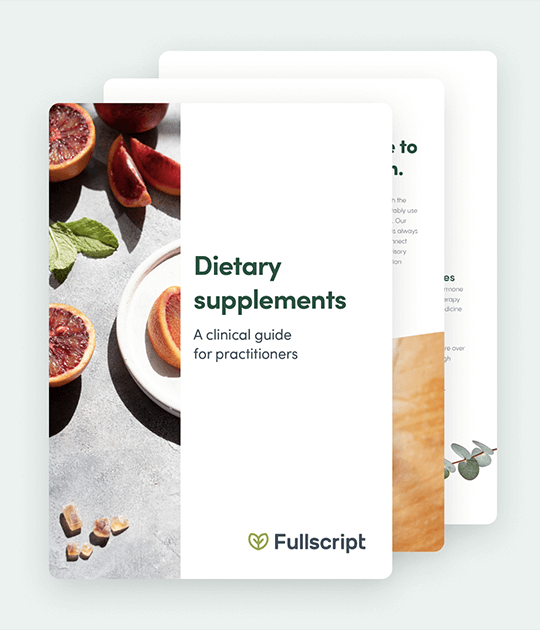What is L-arginine?
L-arginine, used interchangeably with arginine, is an amino acid involved in several processes in the body, including energy production, detoxification, and protein synthesis. (4) L-arginine is produced primarily in the kidneys from its precursor citrulline. (6) L-arginine is classified as a conditionally essential amino acid, which means that under certain conditions, such as stress, the body cannot produce adequate amounts of L-arginine and it must be obtained from dietary sources. (8)(10)(16) L-arginine has antioxidant effects that may protect against oxidative stress, a factor involved in cellular damage and certain health conditions. (15) Further, a number of metabolic pathways use L-arginine to produce active compounds such as the amino acids creatine and glutamate as well as nitric oxide. (4)(17) Enzymes called nitric oxide synthases (NOSs) transform arginine to nitric oxide, which can function as a neurotransmitter in the brain, a mediator in the immune system response, and a vasodilator supporting endothelial health in the cardiovascular system. (2)
Arginine is found in animal proteins, seafood, and certain plant-based proteins.
Arginine foods
L-arginine is found in protein-rich foods and dietary supplements. (10) Foods high in arginine include:- Algae (17)
- Animal proteins (10)
- Certain plant proteins (e.g., rice, peanuts, soy) (11)(17)
- Nuts and seeds (10)(17)
- Seafood
- Watermelon juice (17)
Did you know? The typical North American diet includes approximately five grams of L-arginine per day, (2)(4) which accounts for about 5 to 7% of the total daily amino acid content consumed. (6)
L-arginine benefits
Approximately 60% of the arginine absorbed from the diet is metabolized by the gastrointestinal tract, while only approximately 40% enters circulation throughout the body. As a result, supplementation is often needed to increase levels in the body. (6) As a conditionally essential amino acid, there is no daily requirement established for L-arginine. However, scientific literature has examined the effects of L-arginine supplementation, which include a broad variety of health benefits.Aging
Aging is a complex process that involves the decline of many body functions. Due to its wide range of physiological effects, L-arginine may improve longevity and health during aging. For example, arginine may stimulate the thymus and increase the production of certain immune cells, thereby improving immune function. Arginine has also been found to increase cognitive function in aging individuals with dementia. (6)Blood pressure
In the body, arginine is used as a precursor to nitric oxide, a signaling molecule that helps dilate blood vessels and reduce vascular resistance, the resistance of blood flow that maintains blood pressure. (4)(10) A meta-analysis found that supplement interventions with a 9 g average daily arginine dose over a four-week average duration were associated with a 5.39 mmHg reduction in systolic blood pressure and a 2.66 mmHg reduction in diastolic blood pressure, a difference comparable to the results of certain dietary and exercise interventions. (5)(9)Exercise performance
One double-blind, placebo-controlled trial in male soccer athletes found that a 45-day L-arginine intervention was associated with increased sport performance compared to a placebo. (13) Other trials suggest that L-arginine supplementation used to support a weight lifting exercise program can increase muscle mass and strength. (6) L-arginine may potentially benefit exercise performance by increasing growth hormone secretion as well as creatine and nitric oxide production. (4)
L-arginine supplementation may increase exercise performance, (13) muscle mass, and muscle strength.
Glucose metabolism
In an 18-month controlled trial of L-arginine supplementation in individuals with impaired glucose (sugar) tolerance, individuals in the L-arginine group had improvements in insulin secretion, oxidative stress, and diabetes incidence compared to placebo. These findings suggest that L-arginine supplementation may delay the onset of type 2 diabetes. (12)Fertility
Arginine may potentially support female fertility by improving blood flow in the endometrium (uterus lining). However, in clinical trials of arginine supplementation in females with infertility, there was no association between L-arginine and pregnancy rate. (15) In males with infertility, arginine has been shown to improve sperm motility and count, which is said to occur as a result of increased nitric oxide synthesis. (3)Lipid profile
Dyslipidemia, having irregular levels of blood lipids such as triglycerides, is a major risk factor for cardiovascular disease. A systematic review and meta-analysis of L-arginine supplementation on blood lipid levels found that this amino acid may significantly reduce triglyceride levels, although there is insufficient evidence to suggest effects on cholesterol levels. Further controlled trials in individuals with dyslipidemia are needed to help develop L-arginine recommendations. (7)Mood
Low levels of arginine have been associated with an increased risk of major depressive disorder. Researchers indicate that low arginine levels may impair nitric oxide production and increase oxidative stress in the nervous system. However, intervention trials are needed to examine the effects of arginine supplementation in individuals with depression. (1)Wound healing
L-arginine may support wound healing by increasing collagen, a structural protein, in wounded areas. (16) A systematic review of trials assessed the effect of L-arginine supplementation on wound healing in older adults consuming oral nutrition supplements (a supplement combining macronutrients and micronutrients). The findings suggest that L-arginine combined with oral nutrition supplementation is associated with improved wound healing and reduced wound size when compared to oral nutrition supplementation alone. (14)L-arginine side effects
Supplemental doses of approximately three to eight grams per day of L-arginine are generally considered to be safe. (2) L-arginine side effects including gastrointestinal discomfort, nausea, and diarrhea have been reported with supplementary L-arginine intake greater than nine grams per day. (17) High-dose, long-term L-arginine supplementation may also lead to electrolyte imbalances in the blood. (3) Approaches that may reduce the risk of these side effects include dividing the supplement dose throughout the day or supplementing with L-citrulline, a precursor to L-arginine, as an alternative. (17)The bottom line
As a conditionally-essential amino acid, L-arginine may be necessary to obtain from dietary sources or supplements. Research suggests that arginine supplements may benefit a number of conditions, such as cardiovascular, neurodegenerative, and metabolic conditions. (6) If you’re a patient interested in arginine supplementation, speak with your integrative healthcare practitioner for individual guidance.- Ali-Sisto, T., Tolmunen, T., Viinamäki, H., Mäntyselkä, P., Valkonen-Korhonen, M., Koivumaa-Honkanen, H., … & Lehto, S. M. (2018). Global arginine bioavailability ratio is decreased in patients with major depressive disorder. Journal of Affective Disorders, 229, 145–151.
- Böger, R. H. (2014). The pharmacodynamics of L-arginine. Alternative Therapies in Health and Medicine, 20(3), 48–54.
- Buzadzic, B., Vucetic, M., Jankovic, A., Stancic, A., Korac, A., Korac, B., & Otasevic, V. (2015). New insights into male (in)fertility: The importance of NO. British Journal of Pharmacology, 172(6), 1455–1467.
- Campbell, B. I., La Bounty, P. M., & Roberts, M. (2004). The ergogenic potential of arginine. Journal of the International Society of Sports Nutrition, 1(2), 35–38.
- Dong, J.-Y., Qin, L.-Q., Zhang, Z., Zhao, Y., Wang, J., Arigoni, F., & Zhang, W. (2011). Effect of oral L-arginine supplementation on blood pressure: a meta-analysis of randomized, double-blind, placebo-controlled trials. American Heart Journal, 162(6), 959–965.
- Gad, M. Z. (2010). Anti-aging effects of l-arginine. Journal of Advanced Research, 1(3), 169–177.
- Hadi, A., Arab, A., Moradi, S., Pantovic, A., Clark, C. C. T., & Ghaedi, E. (2019). The effect of l-arginine supplementation on lipid profile: A systematic review and meta-analysis of randomised controlled trials. The British Journal of Nutrition, 122(9), 1021–1032.
- Hou, Y., Yin, Y., & Wu, G. (2015). Dietary essentiality of “nutritionally non-essential amino acids” for animals and humans. Experimental Biology and Medicine , 240(8), 997–1007.
- Khalaf, D., Krüger, M., Wehland, M., Infanger, M., & Grimm, D. (2019). The effects of oral L-arginine and L-citrulline supplementation on blood pressure. Nutrients, 11(7).
- McRae, M. P. (2016). Therapeutic benefits of L-arginine: An umbrella review of meta-analyses. Journal of Chiropractic Medicine, 15(3), 184–189.
- Mirmiran, P., Moghadam, S. K., Bahadoran, Z., Ghasemi, A., & Azizi, F. (2017). Dietary L-arginine intakes and the risk of metabolic syndrome: A 6-year follow-up in Tehran lipid and glucose study. Preventive Nutrition and Food Science, 22(4), 263–270.
- Monti, L. D., Galluccio, E., Villa, V., Fontana, B., Spadoni, S., & Piatti, P. M. (2018). Decreased diabetes risk over 9 year after 18-month oral L-arginine treatment in middle-aged subjects with impaired glucose tolerance and metabolic syndrome (extension evaluation of L-arginine study). European Journal of Nutrition, 57(8), 2805–2817.
- Pahlavani, N., Entezari, M. H., Nasiri, M., Miri, A., Rezaie, M., Bagheri-Bidakhavidi, M., & Sadeghi, O. (2017). The effect of l-arginine supplementation on body composition and performance in male athletes: A double-blinded randomized clinical trial. European Journal of Clinical Nutrition, 71(4), 544–548.
- Schneider, K. L., & Yahia, N. (2019). Effectiveness of arginine supplementation on wound healing in older adults in acute and chronic settings: A systematic review. Advances in Skin & Wound Care, 32(10), 457–462.
- Showell, M. G., Mackenzie-Proctor, R., Jordan, V., & Hart, R. J. (2017). Antioxidants for female subfertility. Cochrane Database of Systematic Reviews, 7, CD007807.
- Stechmiller, J. K., Childress, B., & Cowan, L. (2005). Arginine supplementation and wound healing. Nutrition in Clinical Practice, 20(1), 52–61.
- Wu, G., Bazer, F. W., Davis, T. A., Kim, S. W., Li, P., Marc Rhoads, J., … & Yin, Y. (2009). Arginine metabolism and nutrition in growth, health and disease. Amino Acids, 37(1), 153–168.






